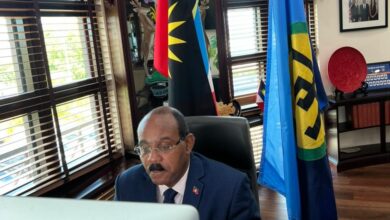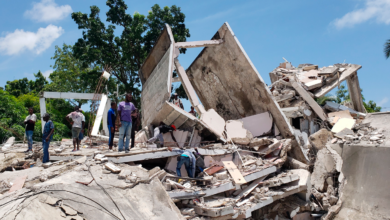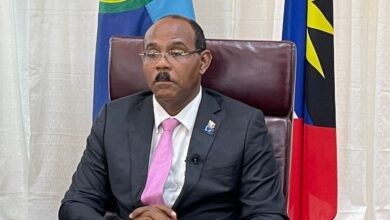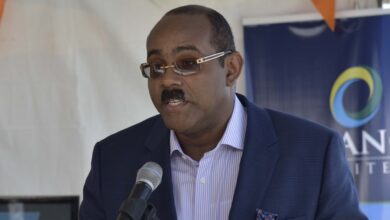We are honoured to have with us, the distinguished Prime Minister of Spain, The Most Excellent Mariano Rajoy Brey, whose country is no stranger to our Caribbean Sea. We look forward with great anticipation to the discussions we will have with him.
Ladies and Gentlemen, it is my great privilege to welcome you all, on behalf of the people and Government of Antigua and Barbuda, to the very place where our modern Caribbean integration movement began 49 years ago.
It was at this very Dickenson Bay, in 1965, that the leaders of Antigua and Barbuda, Barbados and Guyana signed the first CARIFTA accord that reignited the flame of regional integration from the embers of the West Indies Federation.
I was not yet born when that flame was reignited, but it has burned brightly in my breast from the time of my consciousness.
That flame has been kept alight ever since, not only for me, but for all patriotic Caribbean people.
Sometimes the flame flickered and dimmed; but it has never been smothered nor extinguished.
For the CARIFTA accord of 1965 – and every advance in regional integration – that our one Caribbean has made since then, was born of two practical realties that continue to be the cornerstones of our regional society.
The first is that each of our countries is too small and too vulnerable to sustain itself in an international environment of intense competition, of tough bargaining and of preoccupation by the rich and powerful to achieve national advantage, even at the expense of the poor and weak.
The prospect for our salvation lies today in that same practical principle that inspired it 49 years ago when three leaders set afloat the idea of integration into the Caribbean Sea, that has washed-up mightily on all our shores to create our Caribbean Community (CARICOM) of today.
The second reality is best expressed by a lyrical passage of Pere Labat as far back as 1722, when he asserted that history holds all our countries together in a common destiny. Pere Labat said ‘’ we are all together in the same boat, sailing on the same uncertain sea and…..that it is no accident that the sea which separates our lands makes no difference to the rhythm of our bodies”.
Our experience, since the first of our nations moved to independence on its own fifty-two years ago, affirms the wisdom of Pere Labat’s insightful analogy to the tempo of our Caribbean bodies.
Each of our countries continues to sail on the same uncertain sea except we are now buffeted by economic, social, financial and environmental storms that are more intense than we have ever experienced and that threaten our very survival.
I am perfectly aware that I have said here nothing of which my colleague Heads of Government are not aware, and with which they have not struggled.
But, as the newest Head of Government at this time, I want to declare to my colleagues, and to the people of CARICOM, that my government and I are not only fully – but passionately – committed to regional integration as an important and vital instrument for our development.
I know there will be sceptics who will say that they have heard it all before; they will say that each new Head of Government starts the course at a gallop, only to stumble at the first obstacle, failing to make the leap upon which the sanctity of our Caribbean identity, our Caribbean civilization and our Caribbean independence rely.
But, our people are being pummelled from all sides – in unfair terms of trade; in severely reduced official development assistance; in greater demands for costly regulation and enforcement in financial services that are disproportionate to the risk our systems pose; in the insistence on denying us low cost loans based on the false criteria of per capita income; in pressures to open up our markets in ways that refuse to accept that equal treatment applied to un-equals – represents injustice.
In this context, I affirm my Government’s commitment to the work of the Reparations Commission to achieve reparatory justice for the victims of genocide, slavery, slave trading, and racial apartheid.
The Commission is dealing with an ancient wrong that has contemporary implications.
Acknowledgment of that wrong and negotiation of its settlement are important to the best relations possible with those countries that were party to the injustice.
But, as none of our countries can effectively negotiate, on its own, in the international community for better deals in trade, debt, and access to capital, so too none of our countries can advance the work on reparations on its own.
That, too, is a boat which we are in together.
This, therefore, is the time to set aside the illusion of national salvation entirely by national effort.
National efforts are crucial in all sectors of our economy and in every aspect of our societies, but such efforts should not discount or disdain regional collaboration.
They are two tracks to the same destination; tracks that we need to synchronise and harmonize to achieve the maximum benefit.
It was 25 years ago, almost to the day, that the 10th Meeting of the Conference of Heads of Government in Grenada issued ‘The Grand Anse Declaration’.
In that Declaration, Heads of Government said they were “moved by the need to work expeditiously together to deepen the integration process and strengthen the Caribbean Community in all of its dimensions to respond to the challenges and opportunities presented by the changes in the global economy”.
A number of initiatives were identified, the implementation of which, were eagerly anticipated.
The initiatives did not compromise national sovereignty or diminish in any way the particular characteristics of our people; their objective was to “work toward the establishment, in the shortest possible time, of a single market and economy for the Caribbean Community”.
Twenty-five years later a single market is a work unfinished; a single economy is work not yet begun.
Had that work been undertaken – not by constantly looking over our shoulders at those with a vested interest in narrow insularity – but by steadfastly advancing to the goal of regional prosperity; might we not have been better-off today as a stronger region with greater capacity to bargain in the international community?
In this connection, on behalf of my government, I make it clear that Antigua and Barbuda will uphold the decision of CARICOM Heads of Government and the judgement of the Caribbean Court of Justice (the CCJ) in relation to freedom of movement of Caribbean people.
Just as my government will not tolerate discrimination or unlawful treatment of Antiguans and Barbudans anywhere, so we will not encourage discrimination or unlawful treatment of anyone else and, particularly, our brothers and sisters of the Caribbean.
I wish to emphasize the regional focus of my Government by informing you that, at the very first meeting of the Cabinet, my Government went beyond its treaty obligations and took a decision to abolish with immediate effect the requirement for work permit fees for all CARICOM nationals during the remainder of 2014.
Further, with regard to the Caribbean Court of Justice (CCJ) as the Court of Final Appeal replacing the Judicial Committee of the British Privy Council to which we are grateful for their many years of invaluable service; it is my government’s intention to hold the referendum required by the Constitution to make this possible as soon as practicable.
We can never be truly independent in the region while our final appellate court is the court of our former colonial masters.
The decisions of the CCJ, thus far, can only bolster our confidence in the quality of the jurisprudence that emanates from the Court.
Therefore, Antigua & Barbuda will not loiter on this matter.
We will demonstrate confidence in our own and will take steps, in conjunction with our OECS sister states, to join the appellate jurisdiction of the Caribbean Court of Justice.
Today, I call on the people of the region to rally behind this important aspect of our regional governance, and to support the establishment of our judicial independence in the CCJ.
Ladies and Gentlemen, I am not so dewy-eyed and naïve not to appreciate the challenges that governments face in balancing competing interests in all their societies. And, I congratulate my colleagues who, notwithstanding the obstacles, have kept the faith in advancing our Caribbean Community.
In this regard, I pay special tribute to my predecessor as CARICOM Chair, the Prime Minister of St Vincent and the Grenadines, Dr Ralph Gonsalves, who has been exemplary in speaking out about our weaknesses and blemishes, while focussing on the way forward.
And, it is on that way forward to which I now turn.
I speak no new wisdom by saying that critical to the success of CARICOM as an integration movement are effective governance and free movement, among others.
Let us all commit ourselves to the removal of all barriers to free movement and to accelerate the strengthening of the CARICOM Secretariat to perfect and advance the Single Market and Economy.
Let us re-commit our respective countries to accelerate the integration process.
If we are serious about CARICOM as an instrument for the development of our countries and of the region, we should focus on a priority action plan that is strategically linked to achieving the core objectives of the single market and economy.
Advancing the integration movement cannot be achieved by waiting for the most reluctant of us to act.
Ladies and Gentlemen, perhaps the time has come for integration by a ‘’coalition of the willing’’ in various sectors of the economy instead of allowing those who are reluctant to stymie our efforts to advance.
Thus, for example, there could be collaboration between willing governments and the private sector in the ownership of productive operations in each other’s countries.
Thus, for example, one or two governments might invest in a project in a country with a natural resource that could be developed into a viable project that would create an income stream not only for the government in which the resource resides, but also the governments that invest in the enterprise.
I think here particularly of renewable energy projects that are hydro or geo-thermal related in, say, Guyana, St. Kitts & Nevis and Dominica.
These projects have high front-end capital costs but financial studies that have been done indicate significant returns once they are up and running.
Similarly, while one government might lack the credit standing to raise money in the capital market, if two or more governments approach the market together with equity stakes in the projects, they have a better chance of success. The same principle applies to joint tourism promotion, air and sea transportation.
We must always recall that together we have an abundance of wealth.
Together, our countries possess gold, diamonds, oil, gas, bauxite, forestry, abundant agricultural products and fisheries, tourism and financial services.
Our region is by no means resource poor.
We contribute to our own pauperisation by failing to integrate our resources in joint production and joint ventures.
Is it not time that we stop clinging to limited possessions with limited returns in the name of national sovereignty when such clinging does not improve our circumstances?
Is it not better that we pool our resources to give us all ownership of joint enterprises from which we all derive a greater benefit?
As the current chairman of both, CARICOM and the OECS. I recognise that we have two sets of integration arrangements operating side by side which inevitably, will result in inconsistencies, overlaps and possible duplications.
Notwithstanding this, I believe that the economic union arrangements, being undertaken by the OECS, represent a coalition of the willing, and with complete free movement, its single financial and economic space, can serve as an impetus to the wider CARICOM economic integration.
I therefore urge all the member states of CARICOM to allow the widest possible latitude to the OECS countries to pursue their Economic Union without fear of contravening the provisions of the Revised Treaty of Chaguaramas.
Ladies and Gentlemen, without going into the domestic politics of my country, let me say that we have just come out of a general election that made it clear that the old ways will not do; that we have a population – mostly young people below the age of 30 – that want to see change; to widen the scope of opportunity and to broaden the space for their aspirations.
In many of our countries, unemployment is high – and highest among our young people; bright able-bodied men and women.
Just as the young people of my country are eager to end the old ways; to tear down the barriers to their growth; and to march forward, so I suspect are the youth of most of our countries.
If nothing else, their restlessness should make us realize that the sensible option for creating such space and widening such scope resides in our interdependence on each other.
The alternative is their frustration.
That frustration will result in their rebellion within our borders or their exodus to shores outside our region taking their talents that we urgently need.
This is why, if we are to go forward, we must move together offering our people a shared space in all our countries, and the scope to grow while contributing to national and regional development.
Therefore, while I am acutely aware that I am adding to the mandate of the CARICOM Secretariat and that the money for funding will have to be raised, I urge this Conference to establish a Commission specifically to focus on the issue of Youth Unemployment in our region, with a view to taking urgent action to tackle it.
I suggest that if the idea of such a Commission meets the approval of this Conference, evidence be taken from young people across our region on how they see the issue being addressed.
Our greatest task is to put our people to work.
This is not an unsolvable problem if we face it wisely and courageously.
It can be accomplished in part by national efforts, but it can be accelerated by regional collaboration, treating the task as we would treat the emergency of a natural disaster.
If we succeed in addressing this challenge, we will turn our entire CARICOM neighbourhood into an economic powerhouse.
Production integration, joint ventures, joint risk, joint ownership and reaping joint benefits on a grand scale that joins up banks, businesses and governments through regional collaboration is a large purpose that I fervently hope we can accept as a sacred obligation and a unity of duty to our one Caribbean people.
I am hopeful that in each of our member states that we can remove CARICOM affairs from the scope of political conflict and promote a national consensus that envisions a united Caribbean.
What is it that stops us from achieving a united Caribbean? Is it fear?
If so, I quote the words of a US President Franklyn D Roosevelt as he faced the great depression of the 1930s.
“Let me assert my firm belief that the only thing we have to fear is fear itself—nameless, unreasoning, unjustified terror which paralyzes, needed efforts to convert retreat into advance”.
My Fellow Heads of Government, Ladies and Gentlemen.
On this hallowed ground of Dickenson Bay where regional integration was raised from ruin, we invoke the spirit of Dickenson Bay today.
We have paused enough; it is time for action.
We have retreated enough; it is time to advance.
I pray for a most successful conference in devising strategies and programs to multiply our material fortunes and to advance the integration movement.
Finally, I call on this Conference to take our people forward together as a united Caribbean nation, of one people with a common destiny.
Thank you.





